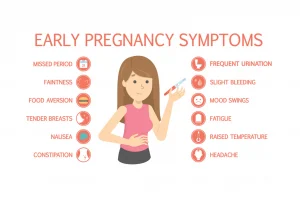Very Early Signs Of Pregnancy 1 Week
Recognizing the very early signs of pregnancy in the first week can be both exciting and nerve-wracking. Understanding these signs can help you know if you might be expecting even before taking a pregnancy test. This guide will walk you through the very early signs of pregnancy at 1 week, from hormonal changes to physical symptoms, giving you a comprehensive understanding of what to look for.
Understanding Very Early Pregnancy
The first week of pregnancy can be subtle, as the body is just beginning to adjust to the changes that pregnancy brings. During this time, the fertilized egg travels to the uterus and begins to implant itself into the uterine lining. Early detection of pregnancy is crucial for prenatal care and making necessary lifestyle adjustments.
Hormonal Changes
Hormones play a pivotal role in early pregnancy. The body starts to produce higher levels of progesterone and estrogen, which are essential for maintaining the pregnancy. These hormonal changes can manifest in various physical symptoms, often signaling the very early signs of pregnancy at 1 week.
Fatigue and Tiredness
One of the earliest signs of pregnancy at one week can be an unusual feeling of fatigue. The body’s energy is redirected to support the developing embryo, leading to increased fatigue. It’s common to feel more exhausted than usual during this initial stage.
Breast Tenderness
Breast tenderness is another early indicator. Your breasts may feel sore, swollen, or more sensitive due to the hormonal changes. This is often one of the first noticeable signs and can occur as early as one week into pregnancy.
Nausea and Morning Sickness
Nausea, often referred to as morning sickness, can start earlier than you might expect. While it’s more common around the sixth week, some women experience nausea in the first week. This can be a sign that your body is reacting to the pregnancy hormones.
Increased Urination
Frequent trips to the bathroom might become your new normal. The hormone hCG, produced after implantation, increases blood flow to the pelvic area, causing you to urinate more often. This is a common early sign of pregnancy.
Spotting and Cramping
When the fertilized egg implants into the uterine lining, it can cause light spotting and cramping. Known as implantation bleeding, this is usually lighter than a regular period and can be one of the very early signs of pregnancy 1 week before your missed period.
Mood Swings
Mood swings caused by hormonal changes can make you feel unusually emotional or irritable. These emotional changes are common in early pregnancy and can be managed with self-care and support.
Sensitivity to Smells
A heightened sense of smell is another tell-tale sign. Certain odors that never bothered you before might suddenly become overwhelming. Heightened sensitivity can be an early indicator of pregnancy.
Bloating
Bloating is a common early pregnancy symptom. Hormonal changes slow down the digestive system, causing gas and bloating. Opting for loose-fitting clothes and consuming smaller portions can help ease discomfort.
Changes in Appetite
Your appetite may change, leading to either increased hunger or food aversions. Cravings for certain foods or an aversion to others are common very early signs of pregnancy at 1 week.
Constipation
Constipation can result from a slowed digestive system. To manage this symptom, drink plenty of water, eat high-fiber foods, and stay active.
Diarrhea Pregnancy
While less common, some women experience diarrhea as a very early sign of pregnancy at 1 week. Hormonal changes can affect your digestive system in various ways, including causing diarrhea.
Dizziness and Fainting
Hormonal shifts and changes in blood pressure can cause dizziness or fainting spells.Staying hydrated and transitioning slowly from sitting or lying down to standing can help prevent these symptoms.
Headaches
Early pregnancy symptoms headache can occur due to hormonal changes and increased blood volume. Staying hydrated, getting enough rest, and using safe pain relief methods can help alleviate headaches.
Back Pain
Lower back pain is another early sign. The ligaments in your back may start to stretch and loosen to accommodate the growing embryo, leading to discomfort.
Metallic Taste
Some women report a strange metallic taste in their mouth during the early stages of pregnancy. This can be due to hormonal changes and can be managed by chewing gum or eating mints.
Elevated Basal Body Temperature
Tracking your basal body temperature (BBT) can provide early clues. A sustained elevated BBT for more than two weeks can be an indication of pregnancy.
Changes in Cervical Mucus
Changes in cervical mucus can also be a sign. During early pregnancy, cervical mucus may become thicker and creamier. Observing these changes can help you identify early pregnancy.
Conclusion
Recognizing the very early signs of pregnancy at 1 week can help you take the necessary steps to confirm your pregnancy and begin prenatal care. From hormonal changes to physical symptoms, each sign offers a clue to the exciting journey ahead.
For Some More Information about Pregnancy :- Essential Guide For Women About To Give Birth
FAQs
Can you feel pregnant after 1 week? Yes, some women can feel early pregnancy symptoms as soon as one week after conception, though it’s more common to notice them a bit later.
What is the earliest sign of pregnancy? The earliest signs of pregnancy can include fatigue, breast tenderness, and increased urination, among others.
How soon can you detect pregnancy symptoms? Pregnancy symptoms can be detected as early as one week after conception, but they are more commonly noticed around the time of a missed period.
Can early pregnancy cause UTI-like symptoms? Yes, early pregnancy can sometimes cause symptoms similar to a urinary tract infection (UTI), such as frequent urination and pelvic discomfort.
Is experiencing diarrhea during early pregnancy normal? While less common, diarrhea can be an early sign of pregnancy due to hormonal changes affecting the digestive system.

